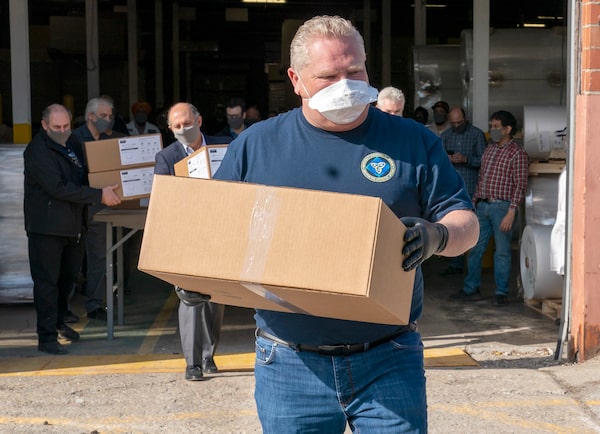
Ontario Premier Doug Ford loads ASTM Level 3 masks made by The Woodbridge Group in Woodbridge, Ont., on April 7, 2020.Frank Gunn/The Canadian Press
Toronto is recalling more than 60,000 faulty surgical masks, made in China and provided to staff at long-term care facilities, and investigating whether caregivers were exposed to COVID-19 while wearing the equipment.
The masks were distributed to the facilities more than a week ago and are being recalled after reports of ripping and tearing, the city announced Tuesday. The incident highlights one of the concerns Ottawa is trying to guard against as governments at all levels scramble to secure vital protective equipment during the COVID-19 pandemic.
Around the world countries have been dealing with defective equipment, including Spain, the Netherlands, Czech Republic and Turkey, which reportedly received faulty masks and tests from companies in China. The Public Health Agency of Canada did not say whether it has experienced similar problems.
Quebec forecasts at least 1,263 COVID-19 deaths with pandemic peaking around April 18
On Tuesday, Public Services and Procurement Minister Anita Anand said Ottawa hired private firms to provide quality assurance before supplies are shipped to Canada, and the federal public health agency does further checks before distributing the goods. Provinces and cities are also sourcing their own equipment and Toronto didn’t order the masks through Ottawa.
Three of the city’s 10 long-term care homes have confirmed cases of COVID-19 and all of them received the faulty masks, spokesperson Brad Ross said. Many of the masks broke while staff were donning the gear and the city said the vendor is refunding the $200,000 cost of the masks.
Fifteen employees at the city’s long-term care facilities have confirmed cases of COVID-19, but Mr. Ross said so far the cases are unrelated to the faulty masks.
The city says it now faces a “significant shortfall” in surgical masks and has asked the province for help to expedite the order. Ontario though is already relying on Ottawa to help procure protective gear such as masks, gowns, gloves and face shields, as demand for them around the world outpaces supply.
Across Canada governments are trying to ramp up domestic manufacturing to reduce reliance on international supply chains but it’s not clear when that will scale up enough to replace or supplement global procurement. Ms. Anand noted some goods, like masks, are already being made here.
Complicating procurement efforts is a White House order granting the Federal Emergency Management Agency the power to block exports of those goods. Late Monday, 3M Co., the supplier of N95 face masks, secured an exemption from the ban, but so far Canada hasn’t won a full exemption from the order.
“There is still more work to do,” Prime Minister Justin Trudeau said Tuesday.
American companies are “major suppliers” of medical equipment in Canada and the government is trying to convince the Trump administration to protect Canada’s supply by pointing out that the trade in critical medical gear crosses the border in both directions, Deputy Prime Minister Chrystia Freeland said.
A White House source said Tuesday the Trump administration is not blocking any companies from exporting medical equipment to Canada. The Globe and Mail is not identifying the person because they are not authorized to speak publicly. FEMA, which has the discretion on when to use the ban, did not respond to a request for comment.
From Washington on Tuesday, Secretary of State Mike Pompeo said his administration’s “focus will be on keeping critical medical items in the United States until demand is met here.” However, speaking in the context of humanitarian aid, he said the U.S. is still providing assistance abroad “because viruses don’t respect borders.”
Ontario Premier Doug Ford said Tuesday the deal struck between 3M and the Trump administration is a “positive development,” but the province is still low on protective equipment and wants to become self-sufficient.
"We can’t count on other countries. We need the federal government to come through on their commitments for supplies to the province, and we need to keep building our own capacity,” he said.
So far though, only a fraction of what Ottawa ordered has arrived in Canada. For example, new numbers show just 2.3 million of the 75 million N95 masks that the federal government has ordered will arrive by the end of the week, and 16 million of out 230 million surgical masks on order have been delivered.
Ms. Anand cautioned that confirming an order “does not guarantee a delivery." To try and ensure the goods arrive, embassy staff and private firms have been tasked with shepherding the supplies through complex and stressed supply chains, she said.
Asked when Canada started to secure protective gear and whether Ottawa failed to procure enough equipment in advance, the Prime Minister didn’t directly answer the question.
“I think we’re seeing right now that the entire world was unprepared,” Mr. Trudeau said. “Some places are facing far greater shortages than Canada.”
To make up for any shortfall, “we will be definitely relying on domestic supply chains,” Ms. Anand said.
Thousands of organizations have already donated millions of supplies, including gloves, masks and gowns, Mr. Ford said, adding more companies are coming forward to help every day. But he did not give a specific timeline on when Ontario may be able to fulfill its own needs.
“Is today better than yesterday? The answer is yes,” he said.
Know what is happening in the halls of power with the day’s top political headlines and commentary as selected by Globe editors (subscribers only). Sign up today.
 Marieke Walsh
Marieke Walsh Laura Stone
Laura Stone Adrian Morrow
Adrian Morrow